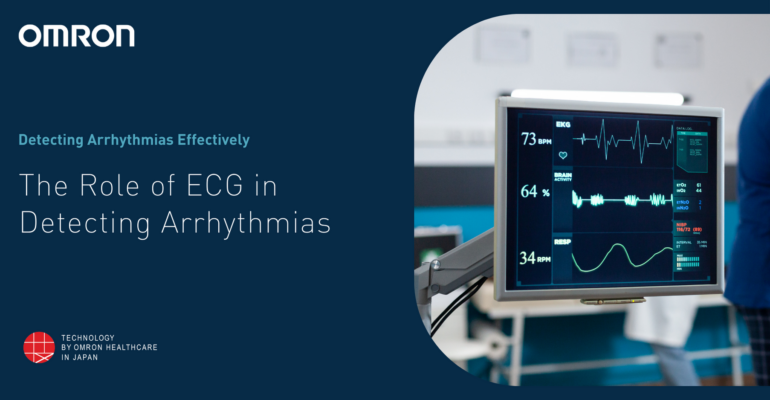The Role of ECG in Detecting Arrhythmias
November 22, 2023 2024-06-26 15:35The Role of ECG in Detecting Arrhythmias

The Role of ECG in Detecting Arrhythmias
The heart, the muscular muscle in charge of pumping blood, works in a rhythmic manner to ensure the flow of oxygen and nutrients to every cell in our body. However, this rhythm can falter at times, resulting in a disease known as arrhythmia.
Arrhythmia disrupts the heart’s natural beat, causing it to beat too fast, slow, or irregularly. This seemingly subtle irregularity can have severe consequences, emphasizing the critical need for accurate detection and monitoring. In medical technology, Electrocardiography (ECG) is a guardian, offering valuable insights into the heart’s rhythm and functioning.
Understanding Arrhythmias
Arrhythmias are a group of conditions characterized by irregular heart rhythms. The heart’s rhythm is regulated by electrical signals that coordinate the contractions of its different chambers. When this system malfunctions, the heart can beat too fast (tachycardia), too slow (bradycardia), or irregularly. Some arrhythmias are harmless and may go unnoticed, while others can be life-threatening. Common arrhythmias symptoms include palpitations, dizziness, shortness of breath, and chest pain.
Types of Arrhythmias
- Tachycardia: This refers to a heart rate that is too fast, typically above 100 beats per minute (bpm). Tachycardia can lead to symptoms such as palpitations, dizziness, and faint.
- Bradycardia: In contrast to tachycardia, bradycardia occurs when the heart rate is too slow, typically below 60 bpm. Bradycardia can result in fatigue, dizziness, and even loss of consciousness.
- Atrial Fibrillation (AFib): AFib is one of the most common arrhythmias, characterized by irregular and often rapid heartbeat. It increases the risk of stroke, as it can lead to blood clots in the heart that travel to the brain.
- Atrial Flutter: Similar to AFib, atrial flutter is an abnormal rhythm in the atria (upper chambers of the heart). It can lead to palpitations and heart failure.
- Ventricular Tachycardia (VT): VT is a serious arrhythmia that originates in the heart’s lower chambers, the ventricles. It can be life-threatening and may lead to sudden cardiac arrest.
- Ventricular Fibrillation (VFib): VFib is a chaotic, disorganized rhythm in the ventricles, and it’s a leading cause of sudden cardiac death.
ECG Monitoring
Electrocardiography (ECG or EKG) is a non-invasive diagnostic tool that records the electrical activity of the heart over a period of time. It’s an invaluable tool for identifying and classifying arrhythmias. During an ECG, electrodes are placed on the skin, and the resulting electrical signals are transformed into a visual representation that healthcare professionals can analyze.
ECGs are traditionally performed in medical settings, such as hospitals and clinics, and are an essential tool for diagnosing arrhythmias. They provide a snapshot of the heart’s activity at the time of the test.
Traditional ECG Vs. Smart ECG
While traditional ECGs and Smart ECG monitoring devices have been invaluable in diagnosing arrhythmias, recent advancements in technology have given rise to a new era of smart ECG devices. These devices combine the power of ECG monitoring with the convenience of modern smartphones and wearables, allowing individuals to take charge of their heart health.
One such smart ECG device is the Omron Complete, which measures both ECG and blood pressure (BP). The device is compact and portable, making it easy for users to monitor their heart health regularly and share data with healthcare professionals if needed. The Omron Complete is a prime example of how technology is revolutionizing the detection and management of arrhythmias.
How Smart ECG Helps in Detecting Arrhythmias
- Convenience: Traditional ECG tests often require a visit to a healthcare facility. With smart ECG devices like the Omron Complete, individuals can perform ECG tests in the comfort of their own homes, reducing the barriers to regular monitoring.
- Continuous Monitoring: Many arrhythmias are intermittent, making them challenging to detect with a single ECG. Smart ECG devices allow for continuous monitoring, increasing the chances of capturing irregular heart rhythms when they occur.
- Immediate Feedback: Smart ECG devices provide real-time feedback and can alert users to irregular heart rhythms as they happen, enabling individuals to seek prompt medical attention.
- Data Management: These devices often come with companion apps that store and organize ECG data. This data can be easily shared with healthcare professionals for better-informed decisions.
- Risk Assessment: Smart ECG devices can also assist in assessing the risk of arrhythmias and other heart problems, allowing users to take preventive steps and make lifestyle modifications as needed.
- Educational Tools: Many smart ECG devices offer educational resources and information about arrhythmias, helping users understand their condition better and make informed choices.
Conclusion
The role of ECG in detecting arrhythmias is essential and irreplaceable, and the emergence of smart ECG devices is revolutionizing the landscape of arrhythmia detection and management for the better. These innovative tools offer convenience, continuous monitoring, and immediate feedback, empowering individuals to take control of their heart health.






